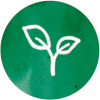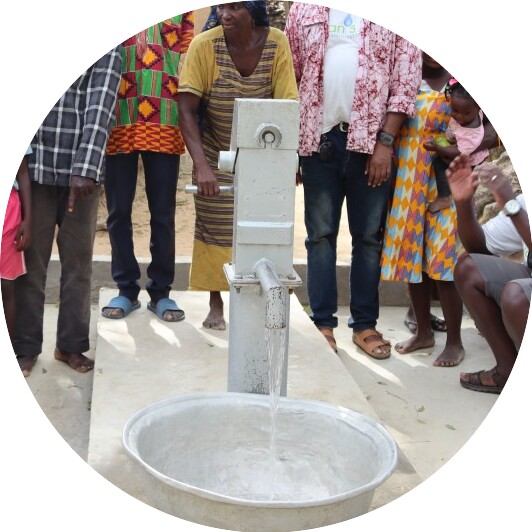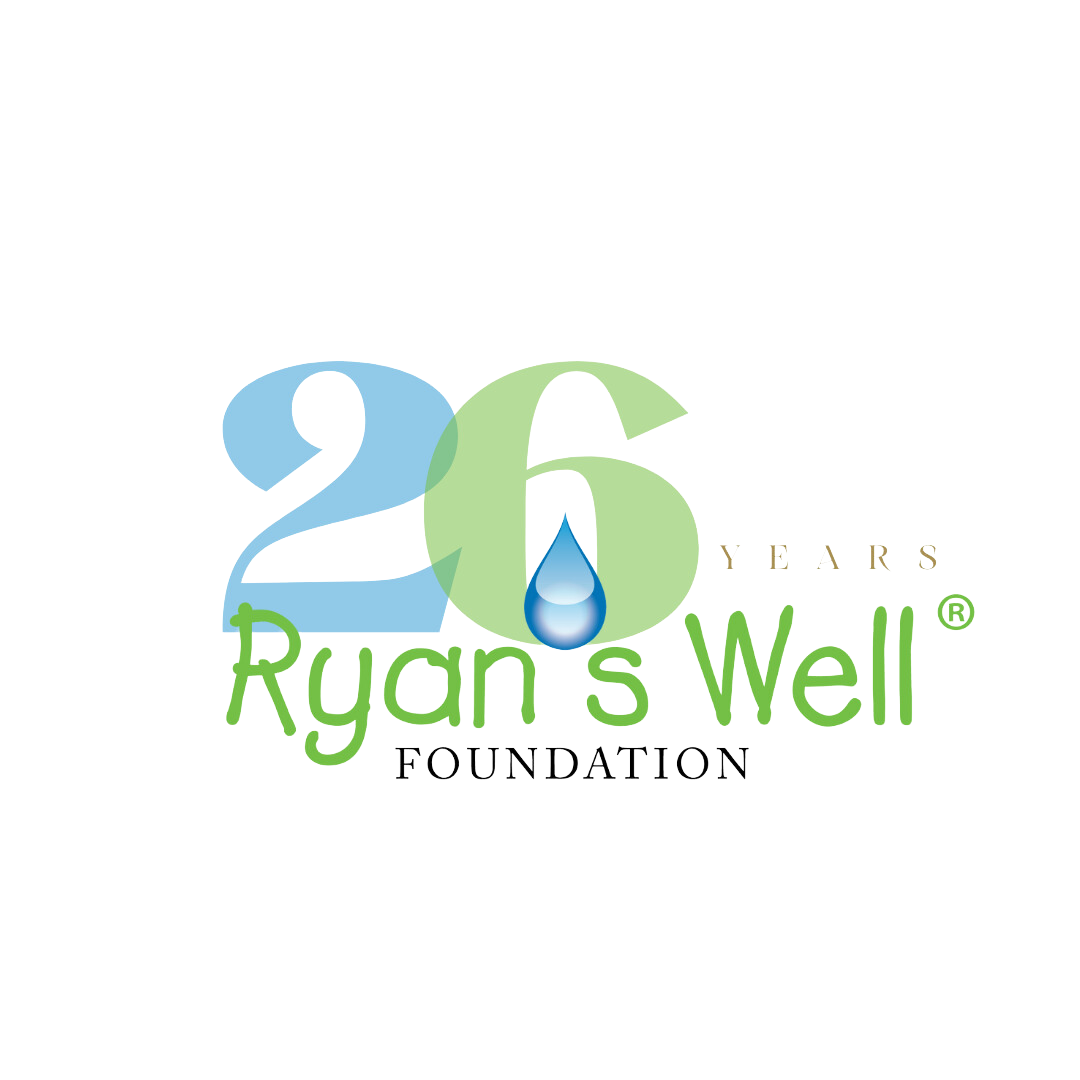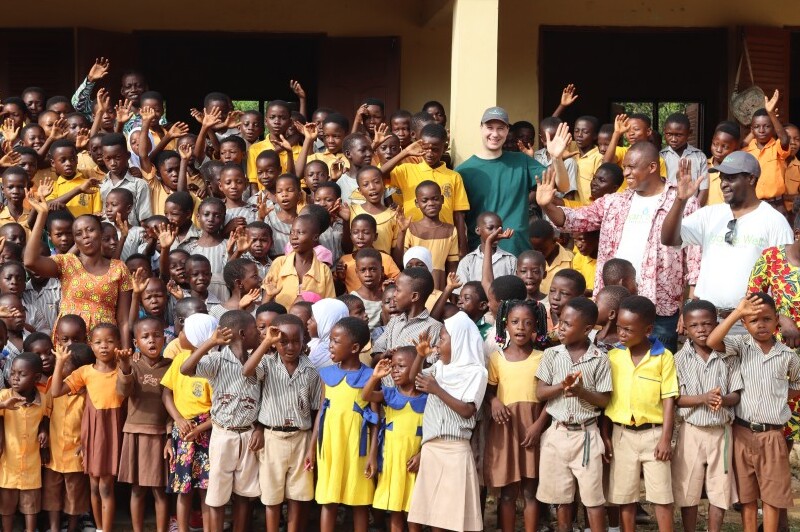 Equitable, Accessible, WASH for Students in Ghana
Equitable, Accessible, WASH for Students in Ghana
WASH Education, training and Deep wells for the Ashanti Region
Water embodies health, education, community empowerment, dignity, hope, and life itself. Lack of access to water, sanitation, and hygiene (WASH) disproportionately affects women and children, particularly girls, who bear the greatest burden in collecting water worldwide (WHO, 2022). Globally, women and girls spend about 200 million hours each day fetching water for their families, amounting to 22,800 years daily. This means, without safe water or sanitation facilities at home, school, health facilities, or workplaces, women and children in developing nations can face a lifelong struggle with wasted time and opportunities, as well as drudgery, disease, and indignity, which becomes more challenging as they age. This initiative aims to promote more equitable access to WASH and tackle ongoing barriers to adequate WASH practices in the Ashanti region of Southwest Ghana by providing deep wells and comprehensive WASH training.
Necessity
Safe, clean accessible water and WASH education is needed for students in Ghana.
Activity
Facilitating the construction of deep wells and the provision of WASH training through local partnerships.
Countable effort
Every GOOD DEED will contribute to providing one hour of WASH awareness training, helping to prevent diseases for a child in the Ashanti region.
Result
Supporting the provision of safe water access and WASH education for over 15,000 individuals in Ghana.
Systemic effect
Assisting in enhancing the health, awareness of water, sanitation, and hygiene (WASH), and the overall welfare of individuals in developing nation.
Background
This GOOD DEED aims to meet the critical needs for clean, accessible water and WASH education in the Ashanti region of Southwest Ghana. According to the World Bank, about 60% of the people in this region lack access to reliable sources of clean drinking water. Instead, people rely on contaminated water from unprotected sources (WBG, 2021). Despite Ghana's mostly flat savannah terrain with few rivers, over five million people rely on potentially contaminated surface water sources, exposing them to waterborne illnesses like cholera and typhoid, which the WHO identifies as a major cause of premature death in Ghana (WHO, 2023). Illegal mining in Ashanti region has further exacerbated the problem by polluting surface water with toxic and heavy metals such as mercury, lead, and arsenic, contributing to the nation's overall surface water pollution rate of about 60% (Amoako et al., 2023). Additionally, over 20 million Ghanaians lack proper sanitation facilities hence health issues like dehydration, malnutrition, and diarrhea, which is a primary cause of death especially among children of school going age in developing countries (WSP, 2012; Yeleliere et. al., 2018). Through improving WASH conditions in the Ashanti region, this project not only benefits the health and human rights of students but also positively impacts their families' well-being, contributing to a more prosperous world and sustainable development.
The good deed
In order to enhance equitable WASH service distribution, effective utilization, and maintenance in the Ashanti region, there is an urgent need for residents to have clean water from improved and protected sources to satisfy their drinking, cultural, and household requirements. Currently, communities cannot instigate necessary changes independently due to constraints as a result of inter-play by socio-economic complexities and limited awareness, particularly regarding the importance of improved hygiene and sanitation practices. Local government allocates insufficient resources to meet targeted WASH goals, such as the SDG6, resulting in over half the population lacking access to safe water and WASH education. Hence, this charitable effort will provide one hour of WASH training to students in Ghana, aiming to directly tackle WASH access disparities by supplying deep wells and education to Ashanti region communities.
Challenge
The goals are the construction of 25 deep wells in the Ashanti region of Ghana. The construction of water source supporting structures and mobilization of all 25 communities and organizing 25 Water Committees. Extensive WASH training for all 25 communities. Educate District Assembly members on the Preventative Maintenances Model. Experience-Sharing Workshops, Hand Pump Mechanic Refresher, and Community Dialogue. Ongoing local monitoring and evaluation. The 25 deep wells and WASH training for communities in the Ashanti region will provide students and community members with safe clean water, lessons on sanitation and hygiene, including proper safe water chain techniques. This will reduce if not eliminate issues of water borne diseases, given enough time for school going children for study as well as increase the potential of women who spend lots of time and energy fetching water. Provision of clean water has a multiplier effect that leads to improved livelihoods of the communities. The DONA team will also train pump mechanics for sustainability of the project.

About Ashanti Region, Southwest Ghana
Capital of Ghana
Accra
Population Ghana
34,599,864
2024
57,9% in cities
19,940,842 million
(2024)
Ghanaians living in Canada
estimated to be
in excess of 100,000
GDP per capita
9,766 CAD$
(2024)
HDI
0.602
ranks 145th out of 193 countries
(2024)
down 12 ranks since (2021)
The Ashanti Region of Ghana is referred to as the ‘Kingdom of gold’, with a legacy of fine craftsmanship and culture traditions. Ghana has a rich history dating back to 10,000 BCE. Ghana is a country located in West Africa. The country was the first black African country south of the Sahara to achieve independence from colonial rule. The official language is English.
About the organization and further information

Ryan’s Well Foundation
Website
Further information and source
- • Macrotrends LLC., 2022. Ghana Clean Water Access 2020-2023. The World Bank Group Archives, Washington, D.C., United States.
- • Yeleliere, E.; Cobbina, S. J.; Duwiejuah, A. B. Review of Ghana’s Water Resources: The Quality and Management with Particular Focus on Freshwater Resources. Appl. Water Sci. 2018, 8 (3), 93.
- • Amoako, A. D., Ahiabor, S. Y., Adzim, E., Amofa, F., Machator, J. K., Norviwor, F. A., ... & Mensah, R. (2023). Assessment of Water Access, Sanitation and Hygiene Practices in Ghana: A Case Study of Ketu South Municipality. Journal of Applied Sciences and Environmental Management, 27(10), 2229-2233.
- • WSP, 2012. Ghana loses GHC420 million annually due to poor sanitation.




